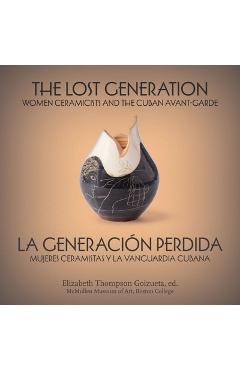The Lost Generation La Generación Perdida: Women Ceramicists and the Cuban Avant-Garde Mujeres Ceramistas Y La Vanguardia Cubana - Elizabeth Thompson Goizueta

Detalii The Lost Generation La Generación
libris.ro
228.48 Lei
253.87 Lei
Art
Elizabeth Thompson Goizueta
The Lost Generation La Generación - Disponibil la libris.ro
Pe YEO găsești The Lost Generation La Generación de la Elizabeth Thompson Goizueta, în categoria Art.
Indiferent de nevoile tale, The Lost Generation La Generación Perdida: Women Ceramicists and the Cuban Avant-Garde Mujeres Ceramistas Y La Vanguardia Cubana - Elizabeth Thompson Goizueta din categoria Art îți poate aduce un echilibru perfect între calitate și preț, cu avantaje practice și moderne.
Preț: 228.48 Lei
Caracteristicile produsului The Lost Generation La Generación
- Brand: Elizabeth Thompson Goizueta
- Categoria: Art
- Magazin: libris.ro
- Ultima actualizare: 08-04-2025 01:30:25
Comandă The Lost Generation La Generación Online, Simplu și Rapid
Prin intermediul platformei YEO, poți comanda The Lost Generation La Generación de la libris.ro rapid și în siguranță. Bucură-te de o experiență de cumpărături online optimizată și descoperă cele mai bune oferte actualizate constant.
Descriere magazin:
An examination of the balance between modernity and tradition in Cuba\'s turn-of-the-century artistic evolution. The Lost Generation La generación perdida accompanies an exhibition of the same name at the McMullen Museum of Art, Boston College. The modern artistic ceramic movement in Cuba, almost exclusively comprised of women artists (including Amelia Peláez, Mirta García Buch, and María Elena Jubrías), emerged toward the end of the 1940s and continued into the next decade. The ceramicists invited Cuba\'s modernist protagonists, including René Portocarrero, Luis Martínez Pedro, and Wifredo Lam, to participate in designing ceramics at the Taller de Santiago de Las Vegas. The workshop thus became a locus for the fermentation of Cuban modernist expression. Juan Miguel Rodríguez de la Cruz, the workshop\'s proprietor, recognized the artistic value of the ceramicists\' production and he, along with the women he hired, encouraged collaboration with their male contemporaries. A symbiotic artistic practice grew in which the ceramicists introduced ideas and designs to the painters, whose fledgling attempts in ceramics took eventual flight. As the painters\' familiarity with the new medium grew, similar forms appeared in their two-dimensional renderings, which are now synonymous with Cuban modernism. During the post-Revolutionary period of 1959-85, the Taller became part of Cuba\'s National Patrimony, continuing the tradition of producing serial and artistic pieces. As the Revolutionary regime wore on, the Taller\'s importance waned, artists left Cuba, and independent workshops flourished. While the Taller de Santiago no longer boasts importance in artistic production today, it left an indelible mark on Cuban modernism. With essays by Cuban, American, and Cuban-American scholars, The Lost Generation La generación perdida provides a background on the twentieth-century avant-garde movements in Cuba; delves into the narrative of an overlooked group of Cuban women ceramicists, assessing the implications of their work on modernism; and, finally, explores in depth the women artists of the third avant-garde generation (1949-58).

Produse asemănătoare

Broken Dreams. Everton, The War & Goodison’s Lost Generation, Hardback/Rob Sawyer
![]() elefant.ro
elefant.ro
Actualizat in 21/05/2025
152.99 Lei

Ask Not Why. Can one child fulfil the dreams of a lost generation?, Paperback/Lucy Montgomery
![]() elefant.ro
elefant.ro
Actualizat in 21/05/2025
41.99 Lei

We Haven\'t Seen Each Other for So Long. Art of the Lost Generation. The Boehme Collection, Hardback/Heinz R. Boehme
![]() elefant.ro
elefant.ro
Actualizat in 20/05/2025
244.99 Lei

Lost Generation. The Story of Cambodian Rock and Roll, Paperback/Susan Fletcher Haythorpe
![]() elefant.ro
elefant.ro
Actualizat in 20/05/2025
66.99 Lei

